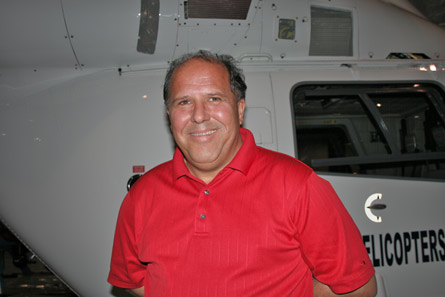Dave Bohonis started his working life as a sheet metal mechanic. Now president of RotorLink Technical Services, he scours the world from North Delta, British Columbia for the components his clients need to fly
What do you do?
I broker aircraft, I do consulting work for insurance companies, aircraft evaluations, parts sales, consignment inventories and so on. It's a broad spectrum. I just bought a big inventory of spares out of Ecuador.
How did you start out?
I started my career as a sheet metal mechanic for Canadair back in 1978. Then I worked for a helicopter business called Eastern Aircraft Standard Repairing in Ontario. After that I went to Boeing Helicopters in Ontario and in 1986 Bell Helicopter opened up in Montreal and I went to work with a contract agency for those guys, and two years after that I went to Eurocopter in Fort Eerie and then I moved down to the States for a company called HeliPro - now, part of Vector Aerospace.
 |
|---|
Bohonis: a keen eye on the market helps track the inventory he needs: "It's all in the network of the people you know and the trust in the relationships that you build." |
HeliPro got you ready for global work?
When I started there I was the tenth employee, banging out sheet metal and fixing helicopters and I ended up vice-president of marketing for the company. They had 500 staff altogether. I was responsible for about 100 employees. The annual sales budget was about $35 million. As the company grew I learned the business side, and decided to venture out on my own.
Was there a memorable first sale?
Yes. The most memorable one was the first million dollar sale that HeliPro had. I was sort of in management but still running the shop floor. We got a contract from IMP Aerospace. They were refurbishing the fleet of Sea Kings for the Canadian armed forces. They'd tried for a year to build these frames and they couldn't build them. We'd never done it before, but we could build anything on a helicopter, so why not? They never showed me their contract because I wasn't really into that side of the business yet. I found out just before we were about to ship the frame that it had to be fully assembled, not just parts!
What's the trick to good service?
It's all in the network of the people you know and the trust in the relationships you build. It's just going that extra mile. Maybe it's a phone call I get from people I know in Australia from my background as a sheet metal mechanic. Sometimes it's actually hopping on an airplane and going to help them fix their helicopters.
What's one strategy to finding inventory?
I track aircraft sales. They have spare parts that aren't sold when they sell the aircraft. How to bid on the parts and still make money? It's a very tight market. Say you've got 5,000 line items of parts. Well, you can go through the price books and put a value to it, but you've still got to know if there's a market for it, if it's obsolete or not. If nobody wants it, it's scrap. You have to really be familiar with this, and that's a big part of my background.
What do you like best about the job, and what's the worst part?
Helping people solve their problems gives me a lot of enjoyment. I find that my job is more like a hobby. My dad told me when I was young, you could be a bad lawyer or a bad brain surgeon or you could take a career that you could excel at, and that's what I did. My dad got me the job at Canadair, only because our next-door neighbour was the head of personnel at the place.
I think the thing I could do without is all the travel. I'd rather stay home when I'm on vacation, but unfortunately the wife and the family want to go somewhere all the time.
Source: Flight International


























